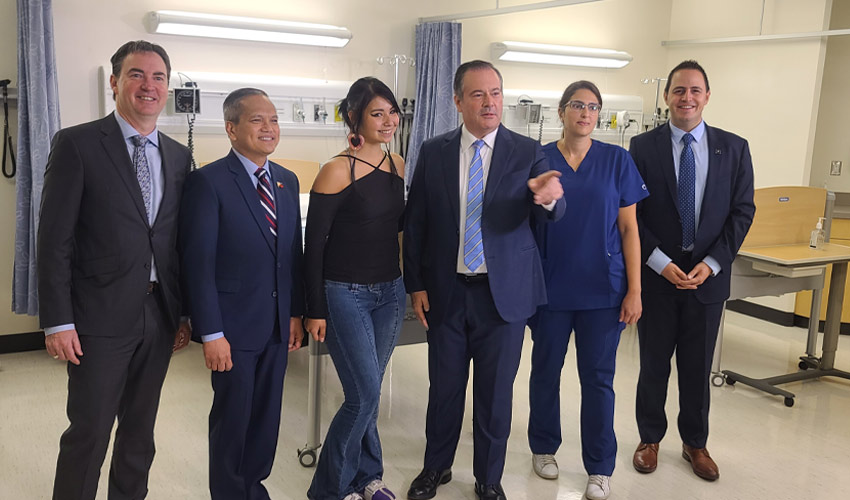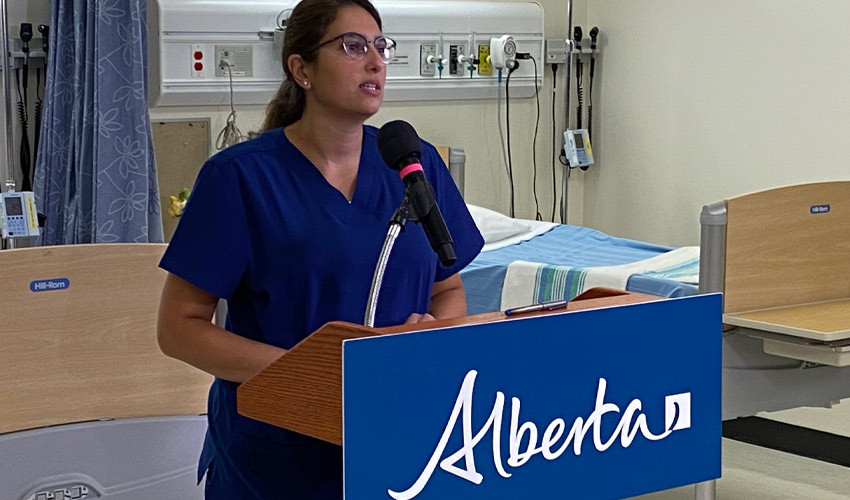Alberta broadens pathway to a health-care career for Internationally Educated Nurses
Announcement at MRU focuses on Bridge to Canadian Nursing
— Mount Royal University | Posted: October 6, 2022

From left: Health Minister Jason Copping, Philippines Consul General Zaldy Patron; SAMRU VP External Tera Leigh Cardinal, Premier Jason Kenney, BCN Student Hana Sahyouni, and Advanced Education Minister Demetrios Nicolaides after government announcement at MRU.
Hana Sahyouni, an internationally educated nurse originally from Lebanon who is now living in Calgary, has been diligently trying to get back to practising health care as a registered nurse, but delays in the system of accreditation have meant that seven years later she is still working towards that goal. She is currently a student in Mount Royal University’s Bridge to Canadian Nursing (BCN) program.
“I came to Canada seeking better life opportunities, especially professionally. I wanted to gain professional experience in one of the world’s leading public health systems and to pursue advanced practice degrees. However, in reality, the licensing process kept me out of practice for more than seven years now. It has been a very long stressful process that is both financially and emotionally draining,” said Sahyouni, prior to speaking at a Government of Alberta announcement held at Mount Royal on Oct. 6.
“I finally got accepted into the Bridge to Canadian Nursing program in January. It feels like a dream coming true. I am very happy to take the first step towards building my professional career here.”
Through the program, Sahyouni is learning about professional nursing in Canada, health alterations and therapeutics, health assessment, gaining professional nursing skills, clinical reasoning skills, nursing theory and nursing clinical practice in a medical and surgical environment.
During the announcement at the MRU Health Simulation Learning Centre, the Departments of Advanced Education, Health, and Labour and Immigration unveiled a three-pronged plan to help reduce barriers for internationally educated nurses. This includes expanding nurse bridging programs like MRU’s, plus clinical placements, while also streamlining the regulatory process and creating a new online platform to help internationally educated nurses navigate through.
At the same time, the government signed a Memorandum of Understanding with the Philippines to assist in the recruitment of both registered nurses and licensed practical nurses to the province, and also announced Alberta now has 223 adult general ICU beds, a 29 per cent increase from before the pandemic.

Bridge to Canadian Nursing student Hana Sahyouni speaks about her experiences at an announcement at MRU Oct. 6.
Currently, internationally educated nurses face long wait times and little financial support to be licensed to work in Alberta. The co-ordinated plan to address these barriers while still upholding high quality of care aims to better support the immediate and future needs of the province’s health-care system.
“Our health-care system needs nurses and internationally educated nurses who immigrate to Canada are a prime source of untapped knowledge and skill,” said Dr. Tim Rahilly, PhD, MRU’s president and vice-chancellor.
“MRU is proud to contribute to helping internationally educated nurses bring their resiliency, determination, patience, strong work ethic and cultural understanding to Alberta.”
BCN student Uche Nechi’s nursing journey began in Nigeria where she practiced in psychiatric, community and medical units before coming to Canada to join her husband and family.
“After seeing how the nurses took care of my grandmother during her final days in palliative care in Nigeria as a young child, I became interested in becoming a nurse,” she recalls.
“In future I hope to further my career and specialize in psychiatric nursing in Alberta,” she says. “What I love about working in health care in Alberta is that they create a supportive environment for all health-care workers, including internationally educated nurses, and bring families together.”

Bridge to Canadian Nursing program coordinator Robyn Stewart speaks with Premier Jason Kenney about the program.
On his last day in office, Premier Jason Kenney spoke at the announcement and cited the global demand for more health-care workers.
“This strategic approach will help get more highly skilled and qualified nurses into our health-care system faster while reminding the world of all the advantages of living in Alberta,” Kenney said.
Advanced education is spending $3.5 million in 2022/23 to begin expanding educational opportunities for internationally educated nurses. The ministry will collaborate with post-secondary institutions to expand the number of seats in existing bridging programs as early as January 2023. New bridging programs and a bursary to assist with the cost of becoming a nurse in Alberta will also be developed.
This program is part of a larger government initiative to ensure that qualified individuals entering regulated professions and designated occupations or trades do not face unfair processes or barriers. This includes the passing of the Fair Registration Practices Act and the creation of the Fair Registration Practices Office.
“Too many internationally educated nurses are unable to perform at their skill level because of the cost and wait time for bridging programs. We are removing these barriers and helping more internationally educated nurses practise their trade to better themselves and our health-care system,” said Demetrios Nicolaides, minister of advanced education.
